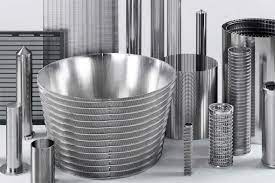Wedge wire screen technology is an innovative and efficient method of filtering liquids, gases, and solids. This type of screening system is commonly used in various industries such as water treatment, mining, food processing, and oil refining.
The wedge wire screens are made up of a series of metallic wires that are wrapped around support rods to form a V-shaped profile. The precise spacing between the wires allows for the filtration process to occur while maintaining maximum flow rate. With its superior durability and high capacity for holding back particles of different sizes, wedge wire screens have become an essential component in many industrial applications. In this article, we will explore the benefits and applications of wedge wire screen technology.
How does it work?
Wedge wire screen technology is a type of industrial filtration system that operates on a simple yet effective mechanism. The screens are made from stainless steel wires, which are welded together to create a continuous and uniform slot opening. When in operation, the liquid or gas flows through the wedge wire screen, with the larger particles and debris getting trapped on the surface of the screen while allowing smaller particles to pass through. This process leads to an efficient separation of solids and liquids.
The efficiency of wedge wire screens depends on various factors such as the size of the slots, flow rate, pressure differential across the screen, and temperature. Manufacturers can customize these parameters depending on their specific application requirements. Wedge wire screens are used in various industries such as water treatment plants, food processing units, mining operations, and oil rigs.
In conclusion, wedge wire screen technology is a reliable filtration system due to its simple yet effective mechanism. The screens offer high-precision filtration capability for a wide range of applications. Industries can benefit from this technology by achieving better product quality while reducing maintenance costs over time due to reduced clogging and fouling issues.
Applications: Where is it used?
Wedge wire screen technology finds its applications in a wide range of industries. In the oil and gas industry, these screens are used for sand control and protection of downhole equipment. They are also used in water treatment systems as well as wastewater treatment plants to remove solids from liquids.
The food and beverage industry uses wedge wire screens for straining, filtering, and sizing various products such as coffee beans, tea leaves, sugar crystals, grains, and nuts. Wedge wire screens are also used in mining operations to separate out mineral particles from ore or for dewatering slurry.
Another application of wedge wire screens is in the pulp and paper industry where they are used for pulp screening, washing press filters or filter screens on continuous digester machines among others. Overall, wedge wire screen technology is increasingly becoming popular due to its versatility and durability, making it useful across many industries.
The importance of wedge wire technology
Wedge wire screen technology plays a vital role in various industrial applications such as filtration, separation, and sizing. Its unique design consists of wedge-shaped wires that are precision welded to support rods, creating a durable and strong structure that can handle high pressures and flow rates. This innovative technology has revolutionized the way industries approach filtration and separation processes.
One of the main advantages of using wedge wire screens is their exceptional durability. With their robust construction, these screens can withstand harsh conditions such as high temperatures and corrosive environments without losing efficiency or requiring frequent replacements. Moreover, their precise opening sizes ensure accurate particle retention while allowing for optimal flow rates.
Furthermore, wedge wire screens offer superior performance compared to traditional filter media like mesh or perforated plates. They provide reliable screening solutions for complex applications involving fine particles or difficult-to-screen materials like wastewater treatment plants, petrochemical refineries, food processing industries etc. Overall, investing in this technology not only improves the quality of final products, but also reduces downtime and maintenance costs.


